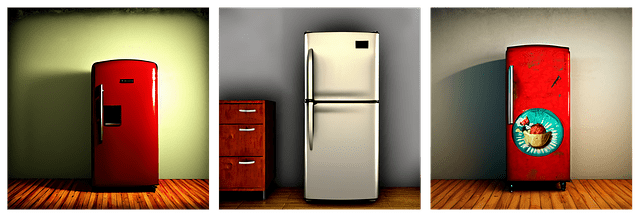An inverter fridge is a newer style that utilizes a different compressor from a conventional fridge which is the standard style that most kitchens typically have.
The main difference between an inverter refrigerator and a conventional refrigerator is the type of compressor that is used to cool the interior of the fridge.
A conventional refrigerator uses a compressor that turns on and off to maintain the temperature inside the fridge. When the temperature inside the fridge rises above the set point, the compressor turns on to cool the interior. When the temperature inside the fridge drops to the set point, the compressor turns off. This on-and-off cycle can cause the fridge to consume more energy and make more noise than an inverter refrigerator.
An inverter refrigerator uses an inverter compressor which can adjust its speed and cooling power based on the temperature inside the fridge. This allows the inverter compressor to run at a steady state, consuming less energy and making less noise than a conventional compressor.
In summary, the benefits of an inverter refrigerator include the following:
- Energy efficiency: Inverter compressors use less energy than conventional compressors, which can lead to lower electricity bills over time. The motor efficiency on an inverter compressor is more efficient than the compressor on a conventional refrigerator. An average inverter fridge can reduce energy consumption by 20% – 30% which is significant since a fridge is plugged in 24/7.
- Consistency in cooling: An inverter compressor can adjust its cooling power as needed, which helps to maintain a consistent temperature inside the fridge. A consistency in cooling is better for the contents inside your fridge particularly fresh produce.
- Less noise: An inverter compressor typically runs at a lower speed and generates less noise than a conventional fridge compressor. Conventional fridges tend to make more noise due to the compressor which starts up at a high speed. An inverter compressor starts up slower and thus runs quieter.
- Longer lifespan: An inverter compressor typically has a longer lifespan than a conventional compressor. The compressor is the heart of a fridge so the longer it lasts, the longer you’ll get to keep the fridge.
Energy cost savings with an inverter fridge
Inverter fridges are typically more expensive than conventional fridges but the energy savings can offset the cost over time.
According to the U.S. Department of Energy, a typical refrigerator can use between 4 to 5 kilowatt-hours (kWh) of electricity per day. This means that a refrigerator can use around 1,460 to 1,825 kWh of electricity per year.
A 20% – 30% energy savings each year with an inverter fridge could translate to a yearly electricity savings of $60 – $75 if we use a 25% energy savings and assume a 16.6 cents/kWh energy cost which is the US average. In 10 years this is at least a $600 electricity savings.
Will I notice a difference with an inverter fridge?
You may notice a difference with an inverter refrigerator in terms of energy efficiency and noise level. The inverter compressor can adjust its cooling power based on the temperature inside the fridge, which can lead to lower electricity bills and less noise.
Additionally, an inverter refrigerator may maintain a more consistent temperature inside the fridge, which can help to keep your food fresher for longer. If you often throw out fruits or vegetables, you may appreciate this benefit.
However, the difference in performance may not be significant enough to justify the cost if you are not concerned with energy efficiency and noise level. Additionally, the main difference in performance may not be noticeable if you are not frequently opening and closing the fridge or have a well insulated room.
To most people, a fridge is a fridge. As long as it works, consumer often shop based on price, design, color and also the ability for a particular model to fit into the space their kitchen will allow. The potential cost savings however could make an inverter fridge a worthwhile choice.
Are inverter fridges reliable?
Inverter refrigerators generally have a reputation for being reliable. Many of the most well-known names in appliances manufacture inverter fridges: LG, Whirlpool, Frigidaire and Samsung.
They use an inverter compressor, which is designed to be more energy efficient and have a longer lifespan than a conventional compressor. Additionally, many inverter refrigerators are equipped with advanced features such as temperature sensors and self-diagnosis systems that help to ensure that the fridge is operating properly.
However, like any appliance an inverter refrigerator can have issues. Some potential problems that can occur with an inverter refrigerator include:
- Compressor issues: The inverter compressor is a complex piece of equipment, and it can malfunction. Since it’s the guts of a fridge, it can’t run without the compressor and would need to be repaired or replaced for the fridge to work properly again.
- Sensor issues: Temperature sensors can become inaccurate over time, which can affect the fridge’s performance.
- Leakage: Any refrigerator can develop leaks, which can cause damage to the unit and the surrounding area.
It’s important to keep in mind that the reliability of an inverter refrigerator can vary depending on the brand and model you choose. It’s a good idea to research the brands and models that interest you and read reviews from other consumers to get a sense of how reliable they are.
Additionally, purchasing an inverter refrigerator from a reputable dealer and ensuring that the unit is installed by a professional can help to ensure that the fridge is operating properly.
And if that’s not enough choice, you might consider a single evaporator fridge in case you’d like to learn about the difference versus a two evaporator model.


